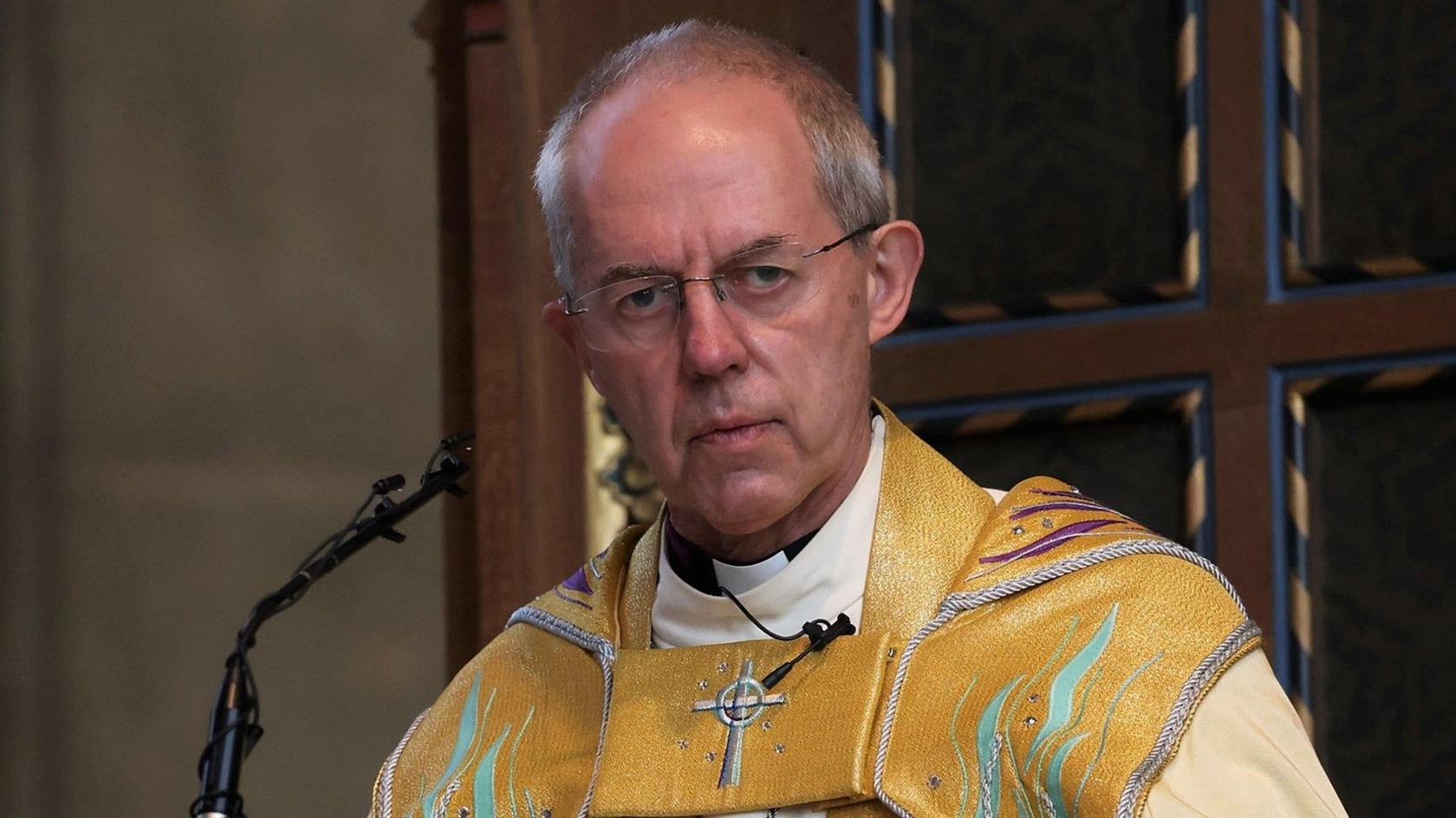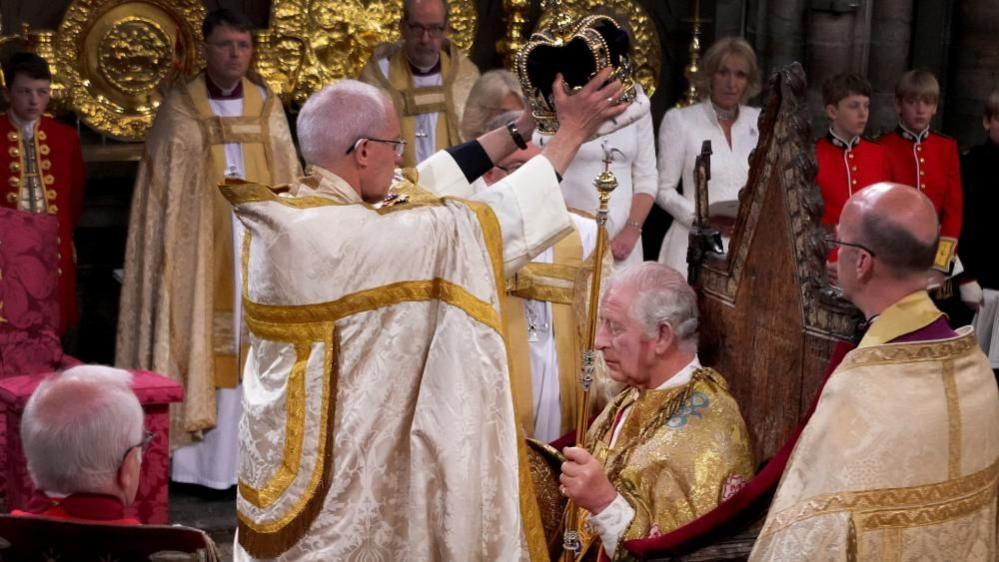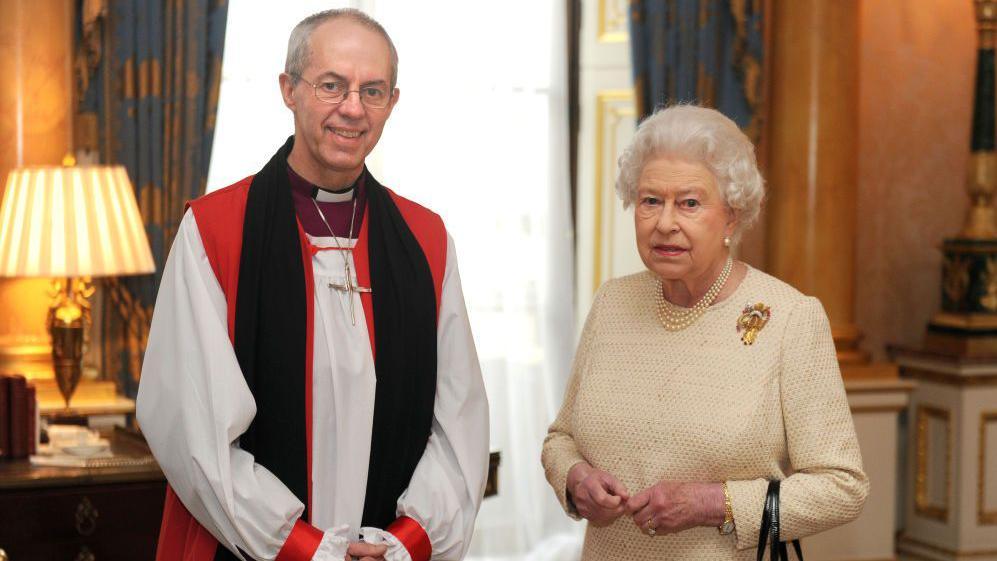Archbishop of Canterbury resigns over Church abuse scandal

- Published
The Archbishop of Canterbury has announced he will step down from his role following a damning report into a prolific child abuser associated with the Church of England.
The review found that Justin Welby, 68, "could and should" have reported John Smyth's abuse of boys and young men to police in 2013.
In a statement, Mr Welby said that "it is very clear that I must take personal and institutional responsibility" for his response after he was first told about the abuse.
"I believe that stepping aside is in the best interests of the Church of England."
"I hope this decision makes clear how seriously the Church of England understands the need for change and our profound commitment to creating a safer church.
"As I step down I do so in sorrow with all victims and survivors of abuse," he added.
A spokesperson for Prime Minister Keir Starmer said he "respects the decision that has been taken and his thoughts remain first and foremost with all the victims”.
It was not immediately clear when the archbishop would leave his post but the process of finding a replacement is likely to take at least six months.
Last week, an independent report found inaction from the Church was a "missed opportunity" to bring Smyth to justice before his 2018 death.
In his resignation statement, Mr Welby said he was "told that police had been notified" at the time and that he "believed wrongly that an appropriate resolution would follow".
He also spoke of his "profound sense of shame at the historic safeguarding failures" of the Church over the days since the report was published.
"For nearly 12 years I have struggled to introduce improvements. It is for others to judge what has been done," he said.
The Archbishop of Canterbury is the head of the Church of England and leads 85 million Anglicans in 165 countries around the world.
Archbishop of York Stephen Cottrell said the Church had made "real progress" in safeguarding under Mr Welby's leadership but added: "There is much further to go."
The Church's lead safeguarding bishop, Joanne Grenfell, said the archbishop's resignation "does not absolve any of us from bringing about the wholesale changes in culture and leadership that are essential".
Former vicar Mark Stibbe, a survivor of Smyth's abuse, said Mr Welby had "done the right thing" in resigning.
"What I think the survivor group would like is more resignations because that means more accountability," he told Channel 4 News.

Justin Welby presided over several high profile ceremonies during his 11 years as archbishop, including the King's coronation in May 2023.
The archbishop had been facing mounting pressure to resign in the days since the report's publication.
A member of the Church’s parliament, the General Synod, who had started a petition calling for Mr Welby's resignation, said: "I think it's sad that it's taken so long for meaningful action to take place."
The Rev Dr Ian Paul added that he hoped that Mr Welby's decision would be the first step towards "cultural change in [the Church's] senior leadership".
Clare MacLaren, Canon Provost of Sunderland Minster, told the BBC Mr Welby’s resignation was "not before time".
"It’s something that’s been brewing for the last 24 hours at least," she said. "It would have been good if he’d done it immediately."
The independent report into the Church's handling of John Smyth's abuse published last week found that from July 2013, "the Church of England knew, at the highest level, about the abuse that took place in the late 1970s and early 1980s," naming Mr Welby specifically.
It found that "several opportunities were missed" to formally report the abuse to police.
One survivor of Smyth's abuse told the BBC the archbishop and the Church had effectively been involved in a "cover-up".
The archbishop said in his statement that the report had exposed a "conspiracy of silence" about the abuse.
Smyth was a prominent barrister as well as a lay preacher - a member of the congregation who delivers sermons but is not ordained - who ran summer camps for young Christians.
The report accused him of attacking up to 30 boys he had met at the summer camps during the 1970s and 1980s with a "clearly sexually motivated, sadistic regime" of beatings.
He singled out boys attending the camps and in sessions at leading public schools, including Winchester College, before taking them to his home and beating them with a garden cane in his shed.
Smyth then relocated in the 1980s to Zimbabwe, and later South Africa, where he is alleged to have abused a further 85 to 100 "young male children aged 13 to 17".
Smyth is believed to have continued his abuse in South Africa until he died in Cape Town in 2018, aged 75.

Mr Welby met Queen Elizabeth II at Buckingham Palace shortly after he became archbishop in February 2013
Mr Welby was educated at Eton and the University of Cambridge. He spent 11 years in the oil industry before retraining as a priest.
He was ordained in 1992 and became a vicar in Warwickshire, a Canon of Coventry Cathedral, the Dean of Liverpool, and the Bishop of Durham before being appointed Archbishop of Canterbury in 2013.
Mr Welby will be remembered as a political archbishop.
He spoke frequently in the House of Lords, attacked the payday lender Wonga, openly backed Remain in the 2016 Brexit referendum, and heavily criticised the Conservative government over its immigration and welfare policies.
He tried to move the Church away from focusing on its internal debates. But he leaves a national church that is smaller, and as divided as ever.
Archbishop of York Stephen Cottrell told the BBC the ordination of women as bishops and his work in racial justice were key parts of Mr Welby's legacy.
BBC Action Line: If you have been affected by issues in this story, find out what support is available here.